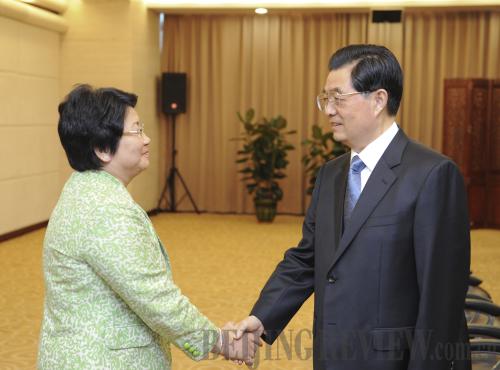|
 |
|
IMPROVING RELATIONS: Chinese President Hu Jintao meets Tajikistan's President Emomali Rahmon in Astana on June 14 (XIE CHUANCHI) |
In the past 10 years since the Shanghai Cooperation Organization (SCO) was founded on June 15, 2001, China has played a significant role in the organization and would continue to make every effort to promote the organization's development, said Zhao Mingwen, Director of the Center for Periphery Security Studies at the China Institute of International Studies.
"China will never fail to live up to the expectations other member states hold for it. It will try its best to advance the interests of SCO member states," Zhao said.
Leaders of the SCO's six member states held their annual summit in Astana, capital of Kazakhstan, on June 15, 2011. The summit, which also marked the organization's 10th anniversary, ended with a declaration pledging enhanced regional security and economic and cultural cooperation.
The SCO groups China, Russia, Kazakhstan, Kyrgyzstan, Tajikistan and Uzbekistan. It has four observers—Mongolia, Pakistan, Iran and India, and two dialogue partners—Belarus and Sri Lanka.
The Astana summit was a milestone in the development of the SCO, Zhao said. At the summit, SCO leaders reviewed the achievements of the organization during the past decade and charted a blueprint for the next.
The summit showed the increasing attraction of the organization to its member states. This had greatly boosted their confidence and was significant for the organization's future development, Zhao said.
The fact a number of countries want to join the SCO also testifies to the organization's growing influence. The four SCO observer countries have all expressed a wish to become members.
At the summit, Chinese President Hu Jintao made proposals for the SCO's future development. These included strategies for strengthening regional security, practical cooperation and cultural exchanges.
When it was founded, the SCO was largely defined as an intergovernmental mutual security organization. But it has since expanded cooperation to other areas, including economy, science, technology and culture.
Member states have benefited greatly from their cooperation in various fields, especially from mutual financial assistance and energy cooperation, Zhao said.
 |
|
STRENGTHENING COOPERATION: Chinese President Hu Jintao meets Kyrgyzstan's President Roza Otunbayeva in Astana on June 14 (LI XUREN) |
SCO member countries cover a land area of more than 30 million square km, three fifths of the total area of the Eurasian continent. They have a combined population of about 1.6 billion, a quarter of the world's total.
In the future, the SCO is likely to surpass the Commonwealth of Independent States (CIS), an organization of 11 former Soviet republics, in economic output, Zhao said.
SCO member states took the lead in escaping the negative impact of the global financial crisis, and China contributed greatly to the organization's recovery, Zhao said. In 2009, China provided loans of $10 billion to other SCO member states to help them deal with the financial crisis.
At the summit, China officially took over the SCO's presidency for 2011-12. It would actively promote economic and security cooperation among member states during this period, said Chinese Assistant Foreign Minister Cheng Guoping.
Cheng said China would continue to push for the implementation of an SCO action plan on multilateral trade and economic cooperation passed in 2008. Through this effort, it will give impetus to cooperation in finance, agriculture and transportation between SCO member states.
In terms of security, China will support the organization playing a bigger role in combating terrorism, extremism and separatism. Leaders of SCO member states also expressed concern over the ongoing turmoil in the Middle East, Cheng said. In light of this, they agreed to strengthen the role of the SCO in maintaining peace and stability in Central Asia, to avoid the occurrence of any similar situation in the region. | 